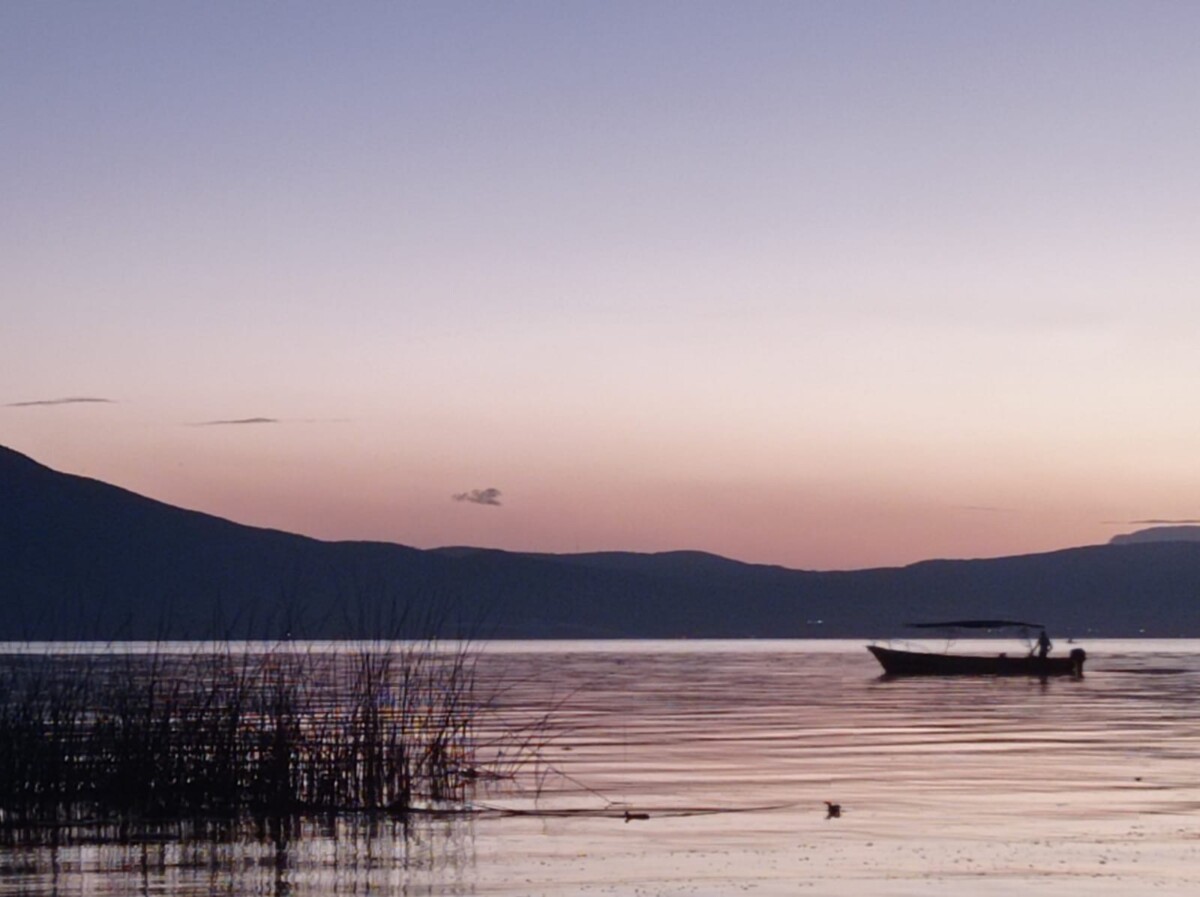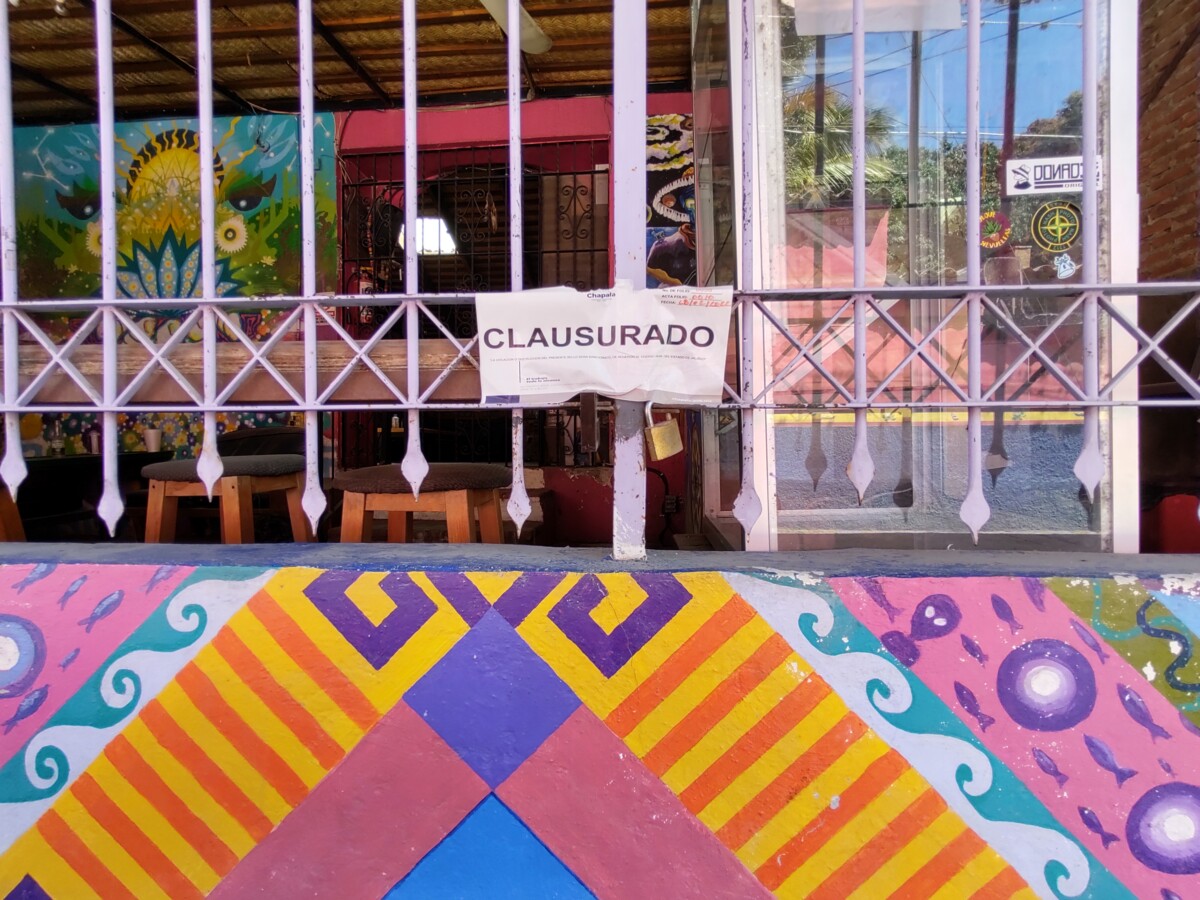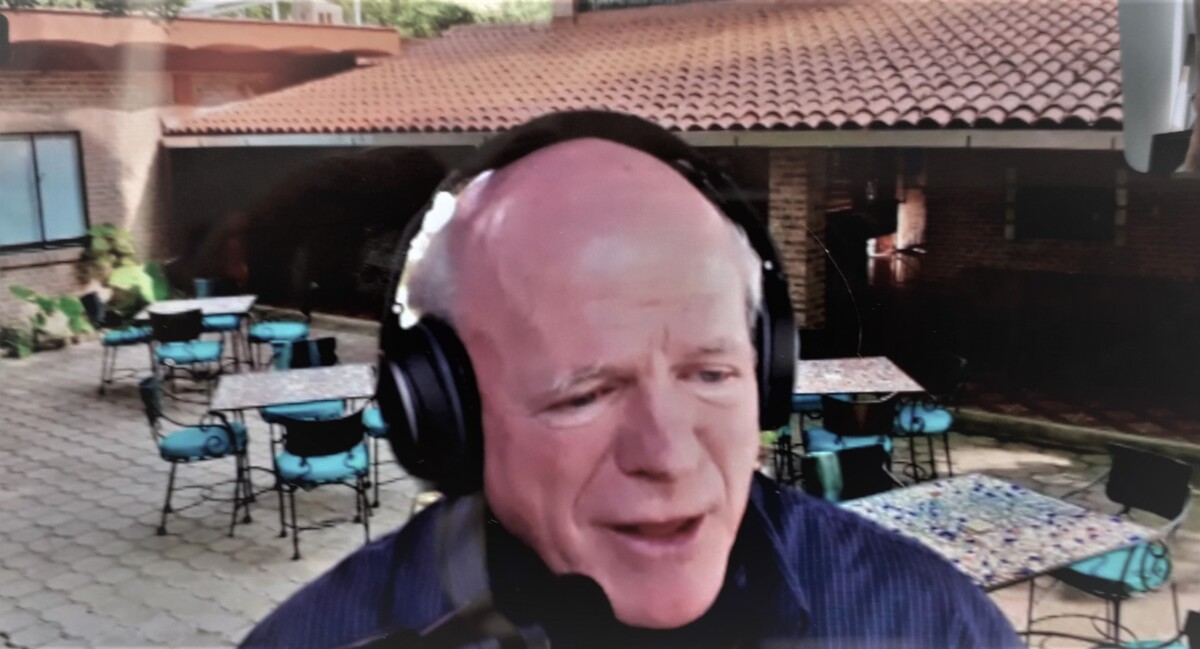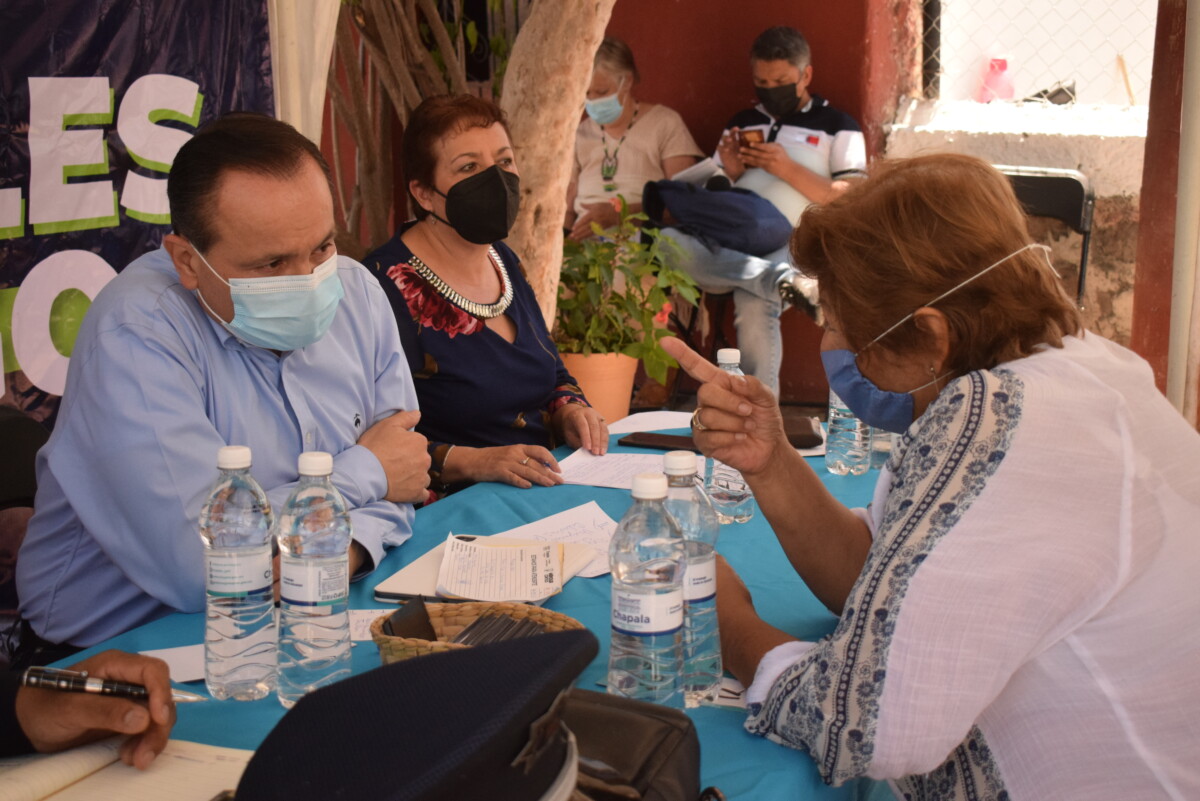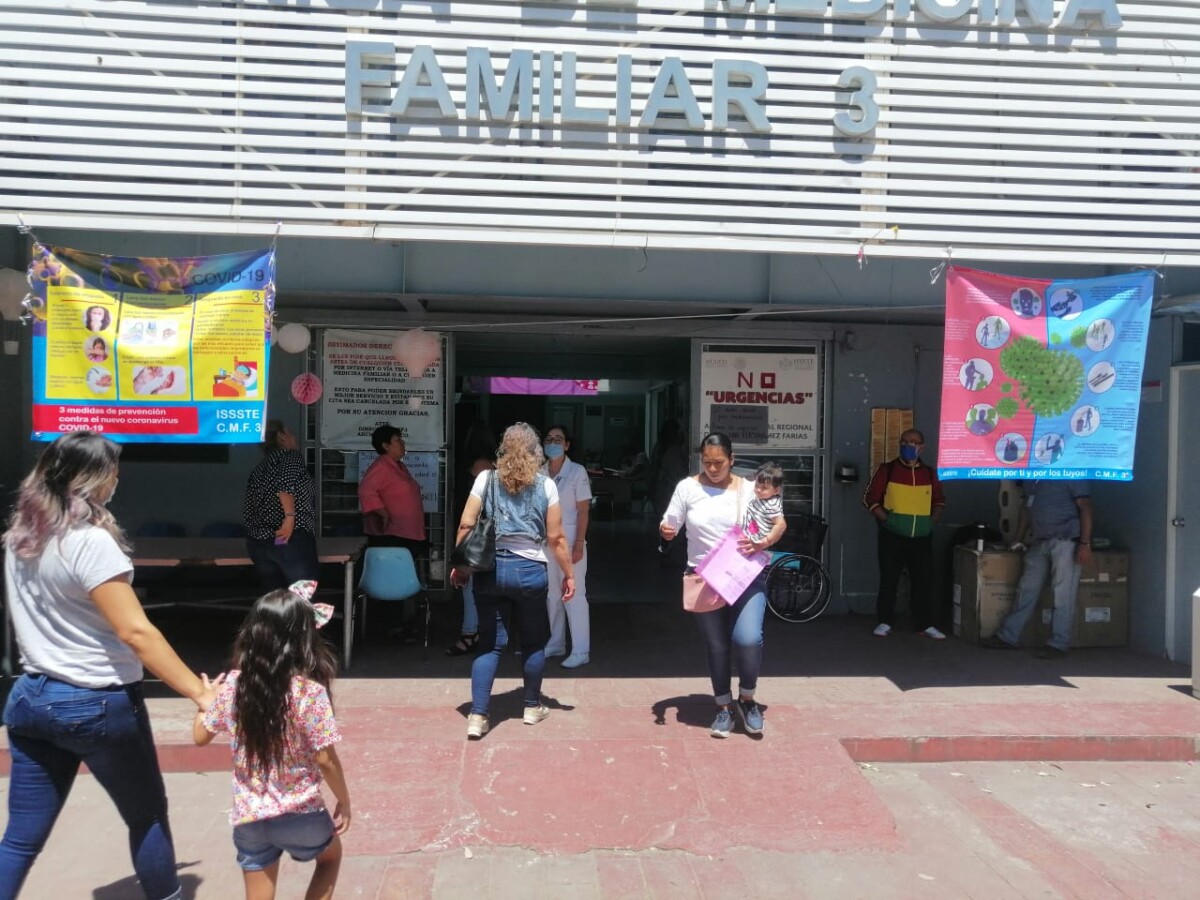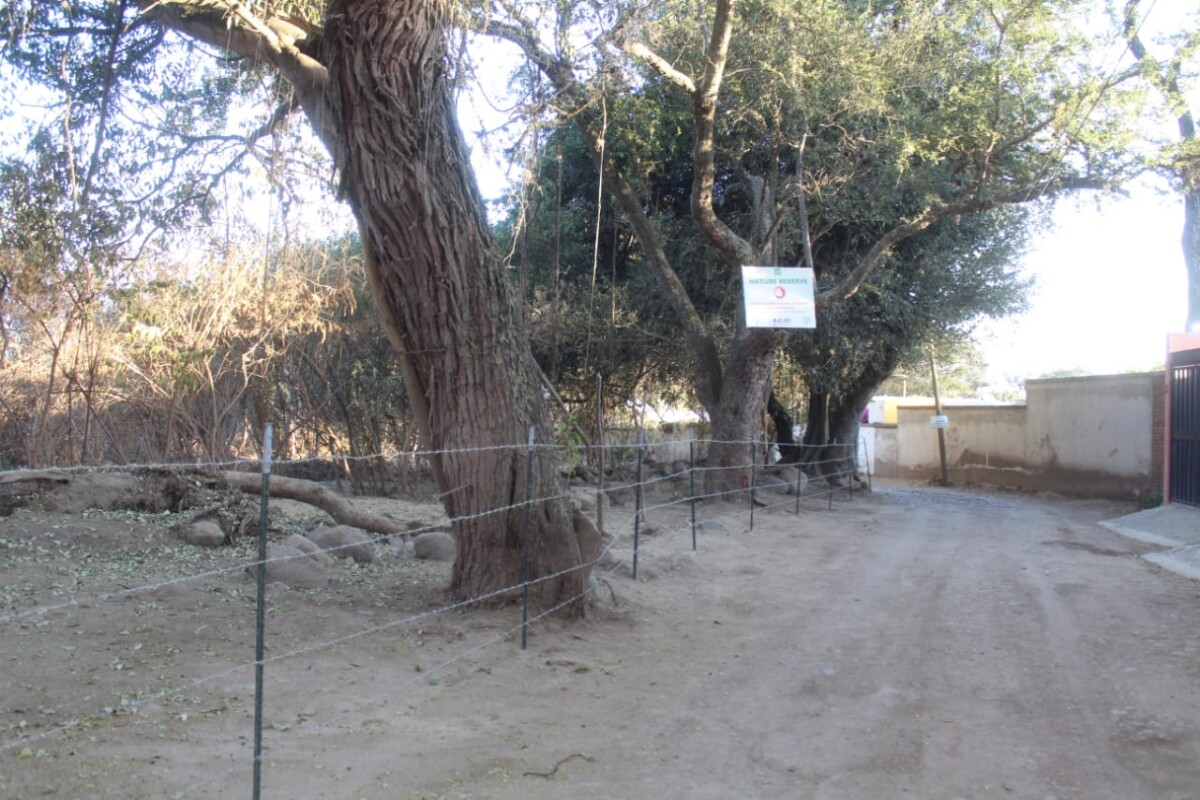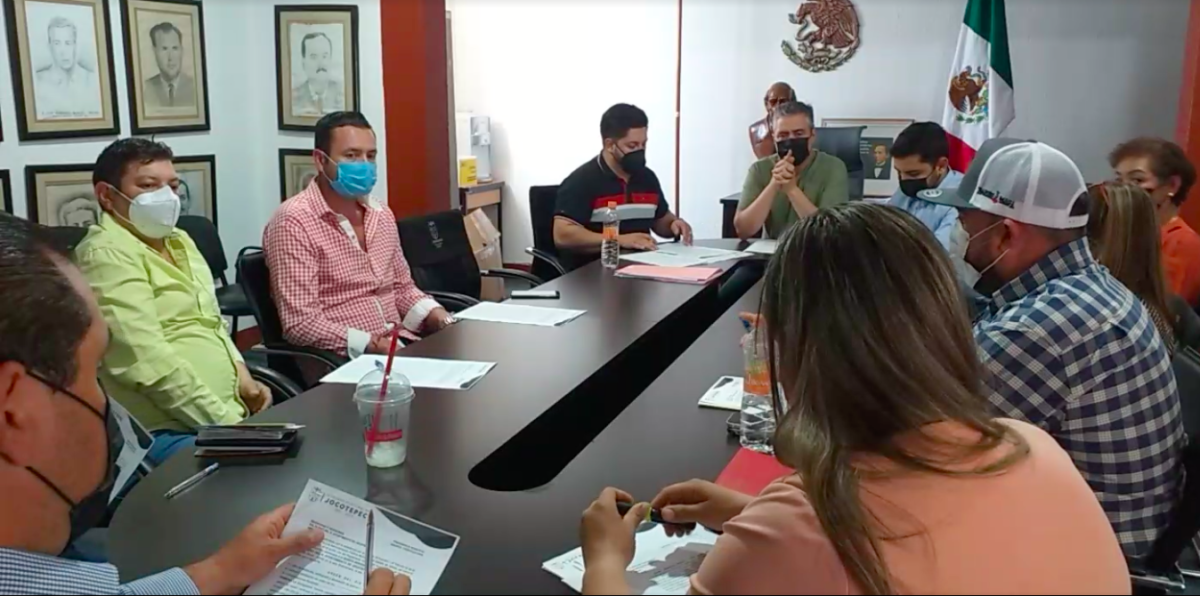en inglés
Photo Caption:
Photo Credit: Arturo Ortega
Despite last year’s good weather, so far in the dry season, Lake Chapala has lost 44 centimeters of water. It is currently at 69% of total capacity. The average reservoir volume in the state of Jalisco is 80%.
Translated by Amy Esperanto
Three bars have been sanctioned in Ajijic for excess noise
The bar «La Mezcalería» was recently closed after complaints from neighbors in the area for excessive noise. Photo: Sofía Medeles.
Sofía Medeles (Ajijic).- Three bars in Ajijic have been closed down by the Chapala’s Regulations, Inspection and Surveillance Department since the beginning of the current administration because of complaints from neighbors for excessive noise and exceeding their permitted hours.
The three are La Mezcalería, La Tía and La Parranda Bar (the latter two were closed months ago), all located in the center of the town, because they stayed open past mandated closing time and exceeded legal noise levels, according to Acting Delegado Maximiliano Macías Arceo.
He explained that the managers of the establishments that were closed were warned about the complaints of the neighbors; however, they ignored them.
«The closed businesses had already been previously warned about the rules they were breaking, especially the hours of operation. We know that young people have their recreational places but in some situations the owners think that there will be no repercussions; but they can’t be violating everything and get away with it,» commented Macías Arceo.
Inspectors from the Regulations Department monitor the areas with these types of businesses during the weekends at night, making sure that they comply with the closing hours, as well as that the sound volume is within the allowed decibels, which is measured with a sound level meter donated to the municipality.
The closures have caused a stir among the inhabitants of Ajijic, who, both in social networks and in interviews conducted by this newspaper, have shown conflicting positions on whether it is right or wrong to resort to this type of sanctions.
«Most of those who complain are Americans, they are not from here and very few attend these places. Now, if they want to start with closures, let them be even, and also do it to event halls, events in the lienzo, and even in the plaza, which have music at full volume, sometimes all night long, and nobody calls their attention, nor regulates them», shared Laura, a local resident.
In contrast, there are those who side with the authority, saying that if they set an example with the businesses that evade the norms, the others will automatically align themselves with what is indicated by Padrón y Licencias. «There is no way that they will continue with their violations if they have already seen that others have been shut down for the same thing,» said another interviewee.
Maximiliano Macías added that the owners of these businesses, upon applying for and paying for the licenses, are given the hours and rules of operation of their businesses, so they cannot plead ignorance. He also suggested that the managers take measures to ensure that their customers leave when closing time is approaching.
According to Macías Arceo, the hours allowed for this type of establishments are a 12:00 a.m. closing from Monday to Thursday and Sundays, and on Fridays and Saturdays closing time is 2:00 a.m.
On the other hand, live music is allowed until midnight any day of the week, but with a maximum of 55 decibels, established in accordance with the Anti-noise Law of the state of Jalisco.
Of the three closed establishments, La Tía and Parranda Bar have already reopened their doors, while El Camaleón bar has been the subject of complaints by neighbors, it has not been closed.
Translated by Patrick O’Heffernan
LCS Annual General Meeting is a “State of the Union” for LCS
LCS Chairman Stephen Balfour conducts a hybrid live and zoom Annual General Meeting from the terrace of LCS. (screen shot)
Patrick O’Heffernan (Ajijic).- The Lake Chapala Society’s Annual General Membership meeting held Tuesday, March 15, was a “state of the union” for one of Lakeside’s largest and most influential non-profit organizations. According to Board Chair Stephen Balfour who led the hybrid live/ zoom meeting.
After a highly produced video tour hosted by Balfour and Executive Director Luis Pacheco with cameos by members of the LCS staff, the Annual Membership Meeting ( AGM) was called to order with 83 people in attendance online and in person at the LCS campus in Ajijic. The tour covered the grounds of the campus and the many improvements that have taken place over the past 723 days since the last in-person AGM.
Highlights of the near 2-hour long meeting included reelection of the existing Board members, election of Choosing Mexico CEO Greg Custer for an at-large Board seat, the introduction of the Mexican Advisory Council led by Cruz Roja Chair Yolanda Martínez Llamas, the renaming of the LCS docents as “LCS Amigos”.
Balfour and new Executive Director Pacheco, the Mexican to run the organization, took the members through the challenges and the accomplishments of the past 723 days, noting that for a while the work of the staff was focused solely on keeping the doors open as membership plummeted by 40% due to Covid.
To pay the bills and keep the staff working, Balfour used his experience as a concert producer in the US to launch the Concerts in the Park series at LCS which raised $2.2 million pesos for LCS and $1 million for Cruz Roja. Additional restricted funds were raised from major donors to purchase the Molenari/West Annex property in November of last year. That combined with $3million pesos in increased donations offset the loss of program income and much dues income to enable LCS to stay open, purchase an adjacent property, and refurbish much of the grounds.
Balfour reported that visitation is up to 1000 a week now, with 40,000 people coming through the doors last year, an indication that the members are returning and engaging in the 100 programs now operating at LCS.
The AGM also included a financial report to the members, informing them that LCS’s financial condition is good, with a cash reserve of $850,000 and an operating deficit of $14,395 which was necessary to complete necessary repairs and maintenance, and a net asset valuation of $30 million.
The final segment of the AGM was dedicated to LCS 2.0, the plan developed and approved by the Board to guide the next decade of LCS. Balfour stressed that he wants LCS to be known for “customer service” . He also listed other priorities as a closer relationship with the Mexican community, continuing to strengthen the bonds with the Instituto Tecnológico Superior De Chapala , and broadening fundraising through innovations like new, smaller, flexible-use “named” tables members can sponsor for $6000 pesos.
The 2022 budget projects $7,009,100 MX in expenses and revenue, with annual dues remaining unchanged from the current $830MX a year for singles and $650nMX for persons age 79 and over in 2022.
El espíritu de puedo ayudarte;
By Patrick O’Heffernan
While attending the LCS Annual Membership Meeting this week (by Zoom from the Semanario Laguna offices) I could not help being impressed by the almost unbelievable amount of activity the organization generates with its 300 volunteers, small staff and very energetic board. It operates or hosts over a 100 programs, including the Todos English program of expat volunteers here at Semanario Laguna who translate all of our Spanish stories into English each week.
Of course, LCS is only one of the many NPO’s (non-profits) in Lakeside. Lakeside Foodbank, Lakeside Little Theater, Niños Incapacitados , Cruz Roja, SOS Chapala DOG Rescue, Bare Stage and Bravo Theater, and many more. The Foundation for Lake Chapala Charities list 25 affiliated non profit organizations, but of course, there are many more that are not affiliated, and even some that are not registered as NPO’s, but still do great work without the imprimatur.
Nationally, the Mexican government reported 5,339 NPOs in the country 2003, but the Inter Press Service (IPS) has suggested that 10,000 NGOs actually exist in México. Mexican non-profits do everything from provide emergency food to families, to rescue dogs and horses, to provide shelter for battered women, to fight for human rights, to help poor families with medical care. In other words, they do everything needed in the country
That is what I call el espíritu de puedo ayudarte – ”the spirit of can I help you”. It is built into the culture.
But organized non-profits on a large scale are not built into Mexico’s history. A 2015 study by the Hauser Institute at the Harvard Kennedy School pointed out that the history of nonprofits in Mexico is relatively recent. Up until the 1880’s philanthropy was almost unknown outside of the Catholic Church. In the early 20th century secular organizations emerged to provide aid to the poor. These civil society organizations grew rapidly under the PRI, becoming almost synonymous with the political party.
But in the 1960s through the 1980’s, the independent non profit sector exploded, propelled by the 1968 student revolution, growing calls for social movements that addressed public needs, and finally the Mexico city earthquake in 1985. The ascent of the PAN party in 2000 opened up new space for nonprofits and they rushed into it.
Here in Lakeside, old timers tell me (since there is no Harvard study)that Neil James and the influx of Expats from the US with 501 (c)(3) (US nonprofit tax exemption) experience kicked off what has become a dense ecosystem of NPOs here.
One aspect of the NPO ecosystem in Lakeside that is important and possible somewhat unique is that it is a force that brings the Mexican and Extrañero communities together. At one level it is Expats working within Mexican communities to help, but at another, very wide level, it is joint Mexican-Expat boards and staffs solving problems together. And the nonprofit sector encourages conscious efforts to reach out, like the Mexican Advisory Board at LCS or Laguna’s Todos English translation team of Expats ( not a non-profit, we hope, but wonderful outreach).
I worked for many decades in and through non profits in the US and even founded a couple. In my experience, the presence of NPO’s in a community is a sign of economic strength, a healthy society, and the kind of heart that makes us good human beings. If you are part of a NPO, thank you; if not; join one. It will make you feel better and help us all. And you will love being part of the ecosystem of el espíritu de puedo ayudarte
President Aguirre Kicks Off “Miércoles Contigo” (“Wednesdays Together”) Program in Plaza de Toros
The president of Chapala, Alejandro de Jesús Aguirre Curiel, listening to the complaints of a local citizen.
Jazmín Stengel (Chapala).– More than fifty residents of the Plaza de Toros neighborhood came to the first «Miércoles Contigo,» a new program where the president of Chapala, Alejandro de Jesús Aguirre Curiel, and his cabinet will listen to the complaints and needs of different neighborhoods within the Chapala municipality.
The program, which was one of his campaign promises, began on March 16th. At the first event, water and unsatisfactory lighting, and garbage were among the most recurrent complaints. There were also requests to change the schedule of the little square to close it at night (for safety concerns), as well as the different workshops that the neighbors wish to give to the children of the area.
According to neighbors, the water shortage has gotten worse since the removal of the stone cistern during the administration of a previous president of Chapala, Jesús Cabrera Jiménez (2010-2012). The cistern had been located in the now small square on Colinas del Manglar.
In response to complaints about the garbage problem, the officials promised to install a large sign informing everyone that garbage should not be left in the small square. This will hopefully prevent people from outside the neighborhood from leaving their garbage in the square.
The purpose of the «Wednesdays Together» program is to listen to the needs of residents so that directors of the various municipal agencies can better solve the problems of each neighborhood, both in Chapala, as well as in the towns and villages that make up the municipality.
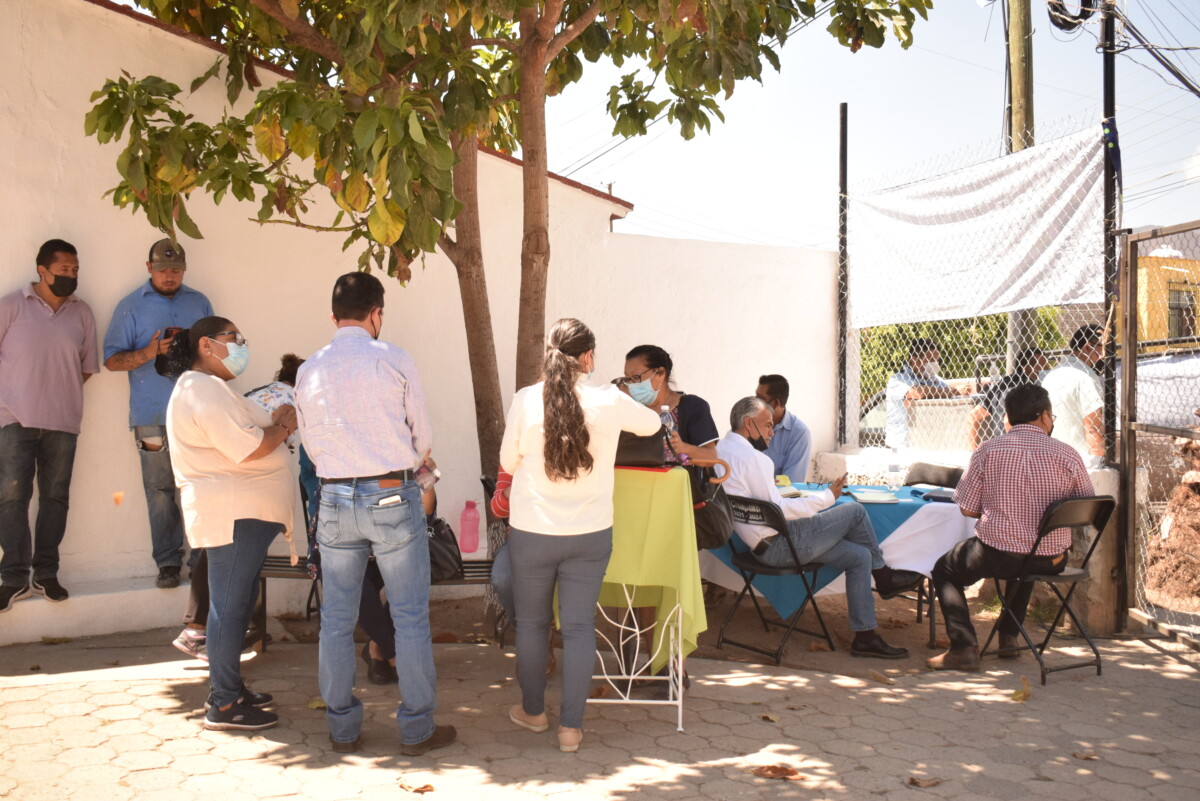
Inside the small square, public officials listening to complaints from citizens
«The main function of government is to be in the street with the people, to address their concerns and needs,» said President Alejandro de Jesús Aguirre. He personally attended to each person’s issue, and then referred them to the appropriate municipal official. It is expected that this will be the way it works every week, said the officials who were interviewed.
At the event, each person who wanted to speak received a numbered card, and a form to write down their complaints, recommendations, and their contact information for follow-up. This three-copy form was distributed as: one to the president, one to the official of the corresponding agency, and one to the citizen
The aldermen present took responsibility to form a neighborhood committee to be in contact with the neighborhood, and follow up on the needs, and requests made. The full calendar of the «Wednesdays Together» program will be announced in the next few days.
Also present at the event were: General Secretary Lilia Alvarado Macías, Trustee Gamaliel de Jesús Soto Pérez, Commissioner of Public Safety, Sergio Conzuelo Ramírez, Head of the Fire and Civil Protection Unit, Lorenzo Antonio Salazar Guerrero, Head of the Municipal System of Potable Water and Sewage (SIMAPA) Chapala, Fernando Antonio Monreal Mendoza, Head of the Women’s Institute, Alicia Medeles Córdova, among other public officials.
Translated by Amy Esperanto
ISSSTE seeks medical office in Chapala
ISSSTE members must continue traveling to the Family Medicine Clinic 3 in Guadalajara for consultations and their medicines, while the Chapala City Council locates an office to provide for medical care.
Editor- After almost two years without medical care in Chapala, the beneficiaries of the Institute of Social Security and Social Services for Workers (ISSSTE), Jalisco Delegation, now have an attending doctor in the municipal seat; however, there is still no clinic for that doctor to provide medical attention.
That is why Elpidio Yáñez Rubio, Secretary General of Section 16 of the National Union of Education Workers (SNTE), sought out the Mayor of Chapala, Alejandro de Jesús Aguirre Curiel, to request a space for a medical clinic.
At the March 3 meeting, the City of Chapala agreed to search out three available locations for a clinic. Those locations will be evaluated by the municipal authorities so that medical services for ISSSTE’s members can be re-established.
Elpidio Yáñez acknowledged the current lack of a hospital to provide medical care and promised to conduct a census of ISSSTE beneficiaries to determine the feasibility of the construction of a medical clinic in Chapala.
Before his resignation in July 2020, ISSSTE medical attention in Chapala and surrounding municipalities had been provided by medical surgeon César Flavio Ibarra Soltero for 21 years.
Translated by MaryAnne Marble
La Cristina residents denounce appropriation of creek and street
A wire fence was placed on Las Garzas street, located to the west of Ajijic, reducing its width. Photo: Sofía Medeles.
Sofía Medeles.- Residents of La Cristina, west of Ajijic, denounced the placement of a fence in the creek and in a stretch of Las Garzas Street by the owner of an adjoining lot. According to those affected, the owner of a carnitas restaurant asserts that the stream is part of his property, so he decided to put up a fence to prevent passage.
Witnesses interviewed shared that the fence was put up five months ago and originally reached behind the trees, a few centimeters from the bank of the tributary. But after last year’s October landslides, the property owner reinstalled the fence at the point where the cobblestone street ends, reducing the street to an approximate width of four to five meters. In addition, the material of the posts and the fence wire were changed.
«The space on the street has been greatly reduced. Before, two cars could pass each other without any problems. Now, if they approach each other head-on, one has to back up almost to the highway to let the other one pass. Also, if you pass by the creek, the man gets furious and says you can’t pass by there because it’s his land,» said a neighbor on Las Garzas Street.
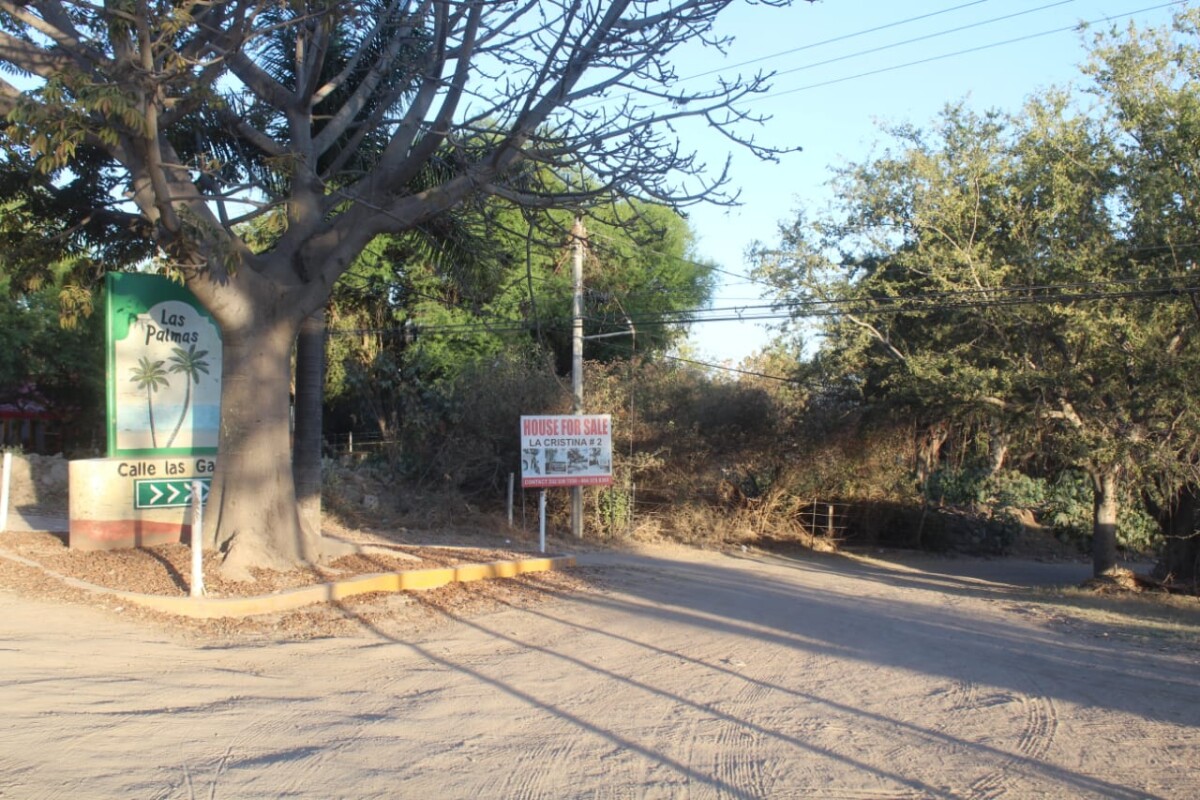
Neighbors of La Cristina denounced that a private individual appropriated the creek. Photo: Sofía Medeles.
In November 2021 the affected residents, mostly expats, gathered signatures and presented them to the City of Chapala to request that the fence be returned to its original location before the landslides.
In this regard, Ajijic acting delegate Maximiliano Macias Arceo said that he was aware of the complaints and that the report has been delegated to the Urban Development Department for review.
The property owner, besides alleging that he installed the fence to prevent access underneath the bridge and because neighbors throw garbage in the creek, says that the creek is part of his property. “The report is now in the hands of Urban Development, so that they can review the property boundaries and, in case of inappropriate expansion, the department will be in charge of realigning it,» said Macias Arceo.
According to the National Waters Law (LAN), streams and riverbeds are federal property; that is, a domain that belongs to the nation and all its inhabitants. This type of land has a buffer strip that varies from five to ten meters wide, depending on its course. To make use of these lands, a concession must be granted by the National Water Commission (CONAGUA). Privatization of these lands is considered a crime.
Translated by MaryAnne Marble
PHOTONOTE:
San Juan Cosalá gas station reopens after closure due to workers’ strike
Alma Serrano(San Juan Cosala).- The KPetrom gas station, located on the Chapala-Jocotepec highway near the San Juan Cosalá intersection, had been closed for a month as part of a worker’s strike. After a new contract with more and better benefits was accepted by the striking workers, the station was reopened on March 12.
Translated by MaryAnne Marble
Families of the two murdered policemen receive 100 percent of their pension
The Council approved 100 percent of the pension of the policemen killed in the confrontation on March 10. Photo: Social Networks.
The Jocotepec City Council Plenary approved payment of 100 percent of the pension to the families of the two policemen killed in an armed attack on March 10.
During the fifth ordinary session of the City Council, held on Thursday, March 17, before discussing the pension granted to the bereaved, the councilors observed a minute’s silence in honor of the security officers who died in the line of duty.
Municipal trustee Carlos Alberto Zúñiga Chacón said that, according to the reports issued by the labor office based on the seniority of the officers, the corresponding pension would be 30 percent; Edgar Omar Leal Nava had been serving in Jocotepec for two years and three months, while Andrés Inclán Zamora had only 52 days.
However, due to their heroic performance and the situation in which they died, municipal president José Miguel Gómez López proposed that it be increased to 100 percent.
«They are behaving like heroes, without weapons, without equipment, it is the least we as social servants can do,» commented Gómez López.
The initiative was approved unanimously, therefore, a monthly amount of ten thousand 500 pesos will be given to the families of those affected, which will be divided equally among the children of each police officer. The pension will be delivered until the last of their descendants reaches the age of majority.
The municipal president also said that, “ after the unfortunate events, it will be, if necessary, to make a pressure the state and federal authorities», to provide more economic support and to be able to adequately equip the public security officers.
The policemen were killed while attending an accident near San Cristóbal Zapotitlán on the evening of Thursday, March 10; two paramedics, a man and a woman, who were also attending the accident, were also injured in the shotting which took place for no apparent reason.
Translated by Patrick O’Heffernan
Digestive Disorders
By Lety Trejo
When we don’t have the right information, it’s difficult to give the body what it needs to work properly. For example, one of the most important components for the well-being of the digestive system is found in microbiota, which used to be known as intestinal flora. Microorganisms, such as bacteria, archaea, aukaryotes and viruses, are present throughout our bodies, so it’s important to clarify that we’re talking about intestinal microbiota. Our second brain, the intestines, depends on a balance of these compounds to separate nutrients in the food we eat from the waste they generate.
A healthy intestinal environment is key to prevention of many diseases, including mental health. For example, saturated fats help increase microbial populations associated with obesity. In contrast, foods rich in insoluble fiber such as vegetables, whole-grain bread and seeds, boost the growth of beneficial bacteria that may help you lose weight. This is according to research in the journal Gut and Liver. Research conducted at the University of Zaragoza shows these microorganisms regulate the levels of serotonin, a neurotransmitter related to our mood. Higher production of serotonin can improve our feeling of well-being.
If you want to maintain a healthy microbiota, stay away from three types of foods:
Industrial pastries have too much vegetable fat, combined with low quality flours.
Ice cream also has too much vegetable fat, as well as too many additives that provide a creamy texture. This category includes mayonnaise from the supermarket.
Artificial sweeteners, particularly those with aspartame, which has been proven to alter insulin resistance and damage the kidneys.
It would be impossible to cut our close relationship with these foods, so I advise you to do it:
Gradually + with constancy + with a lot of patience.
The best way to take care of the digestive system is to know that we are whole beings. The mind affects the body and the body affects the mind. Both affect the way we connect with the universe, with our fellow persons and with ourselves.
Don’t see a nutritionist with the idea of losing weight or looking less fat – that’s superficial. Instead, talk with a nutritionist about how to have healthier intestines and produce more serotonin for a more positive emotional state. Have a great weekend.
Translated by Mike Rogers
© 2016. Todos los derechos reservados. Semanario de la Ribera de Chapala
